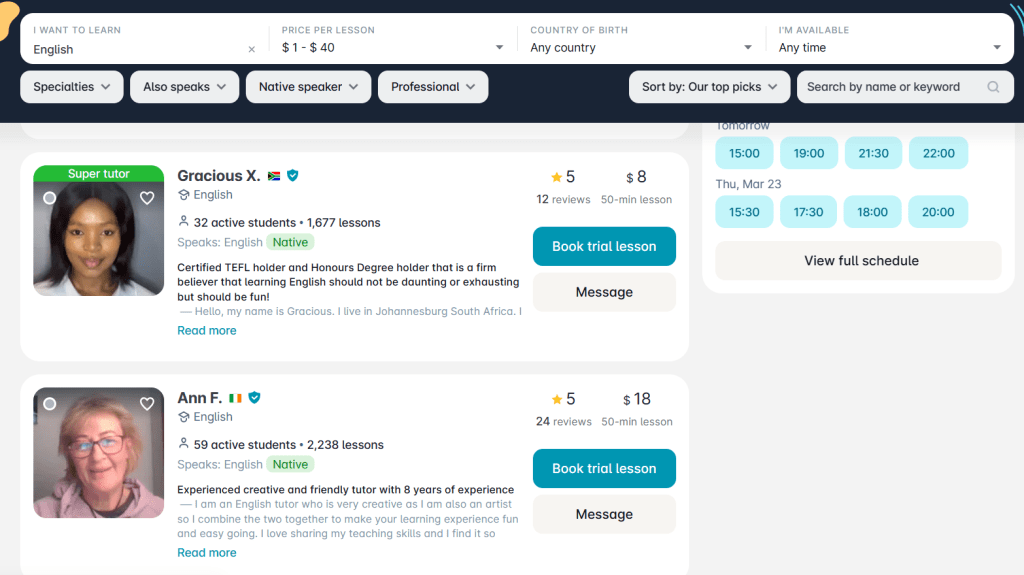Getting Fluent Fast: Learn English Quickly
Learning a new language is a rewarding and challenging experience. English, in particular, is one of the most popular languages to learn, as it is spoken by millions of people across the world. However, becoming fluent in English quickly can be difficult without the right guidance and resources. This article will provide readers with valuable tips for getting fluent fast and learning English quickly.
For those who want to improve their English levels, please also read my article how to improve your English.
Identify Weaknesses
Identifying your weaknesses in English is crucial for improving your language skills. It’s essential to recognize areas where you struggle so that you can focus on improving them.
Identifying weaknesses is like fixing a car engine. You have to open it up, locate the problem, and replace the broken parts in order to make the car run better.
Firstly, it’s important to understand that everyone has weaknesses in their language abilities. Whether it’s grammar, vocabulary, or pronunciation, there are always areas where we can improve. Recognizing these weaknesses is the first step towards progress. Without knowing what you need to work on, it’s challenging to make any meaningful improvements.

- Why do we need to identify our weakness?
One way to identify your English language weakness is by taking an online proficiency test such as TOEFL or IELTS. These tests provide a detailed analysis of your strengths and weaknesses in various aspects of the language like reading comprehension, writing skills, speaking fluency and listening ability.
I determined my English proficiency by watching and listening to high-level meetings and forums conducted in English on YouTube. If I comprehend 80 to 90 percent of the debate on any issue without subtitles, I would be considered to have a high level of fluency in English. I only grasp between 50 and 60 percent; I consider my English proficiency to be low. In this manner, I am able to locate appropriate resources to enhance my English proficiency.
Understanding and identifying weaknesses in your English level is an important part of improving as a speaker. There are many different approaches that can be taken to assess your current level and make steps towards improvement. From taking an online assessment to consulting with an experienced mentor, there are a variety of resources available to help identify areas for growth. Furthermore, developing a plan to practice those areas and striving for measurable goals will help ensure progress is being made.
Set Goals
It’s time to set some goals for yourself! Setting goals is an effective way to track your progress and motivate you towards achieving what you want. Here are a few tips on how you can set goals to make your English fluent:
- Determine where you stand: Understanding your current level of English proficiency is crucial in setting realistic goals. Take a language test or assess your own abilities through self-evaluation.
- Define your objectives: Identify what aspects of the language you need to improve on, whether it’s speaking, listening, reading or writing.
- Set specific targets: Break down larger goals into smaller and more achievable ones with deadlines attached. For instance, aim at learning 10 new words every day or practicing speaking with a native speaker twice a week.
Setting goals is the cornerstone of achieving success in any endeavor, and learning English is no exception. Whether you are a beginner or an advanced learner, setting achievable goals can help you make significant progress towards fluency. These goals will act as a roadmap for your language learning journey and keep you motivated to work towards your objectives.
Make a study plan
Being proficient in English can open up numerous opportunities for both personal and professional growth. However, simply wanting to learn English is not enough. One must have a well-planned approach towards learning the language to achieve fluency. Having a plan for English learning is essential as it helps individuals set realistic goals, measure progress, and stay motivated.
Creating a plan for English learning involves identifying one’s current level of proficiency in the language, setting achievable goals, and choosing appropriate resources to aid in the learning process. Without a plan, individuals may struggle to remain focused or may end up wasting time on ineffective strategies that do not yield desired results. A well-designed plan also allows learners to track their progress over time and make necessary adjustments based on their strengths and weaknesses.
To design a learning plan, we can go through some of these guides that may be helpful for your ideas.
- Set Reasonable Deadlines
Setting reasonable deadlines would help to keep track on our progress and work to meet the deadlines. It will also help to alert you as well about when it could be possible for your plan. Deadlines will keep you determined and at least it will help to motivate and inspire your learning when you feel depressed and hopeless by looking back at your schedules.
When it comes to learning English, it’s important to have a study plan. A good study plan sets you up for success by outlining your goals and the steps needed to achieve them. However, one common mistake students make when creating their study plans is setting unrealistic deadlines. While it’s great to be ambitious, setting unreasonable deadlines can lead to frustration and burnout.
To set reasonable deadlines for your English study plan, start by assessing how much time you realistically have available each day or week. This will help you determine how much material you can cover in that time frame without feeling overwhelmed. Remember that quality practice is more important than quantity, so focus on mastering concepts rather than rushing through them just to meet a deadline.
- Break Down Your Study Sessions
Studying is an essential part of our lives, whether we are students or working professionals. However, it can be overwhelming to sit down and study for hours on end without taking any breaks. This is where breaking down your study sessions comes in handy. By dividing your study time into smaller chunks, you can improve your focus and retention while reducing stress levels.
Breaking down your study sessions is like completing a jigsaw puzzle. If you take the time to piece together each small section correctly, you’ll eventually have a successful end result.
The first step in breaking down your study sessions is to set a realistic goal for each session. Determine what you want to achieve during the allotted time frame and make sure it’s feasible within that period. Next, create a schedule that incorporates multiple short breaks throughout the day. These breaks should be long enough to give your brain a rest but not too long as they could break your concentration.
- Utilize Different Learning Strategies
Utilizing different learning strategies is an essential step towards improving your ability to learn and retain information. One of the most effective ways to learn is through visual aids, such as diagrams, charts, and graphs. These tools can help you visualize complex concepts in a way that makes them easier to understand and remember.
It’s like having a toolbox with different tools for different tasks. You wouldn’t use the same hammer to drive a nail as you would to unscrew a bolt, so it is important to choose the right tool for each job.
Another strategy that can be useful is active learning. This involves engaging with the material on a deeper level by asking questions, participating in class discussions, and completing hands-on activities. This approach helps you not only absorb information more effectively but also develop critical thinking skills that are invaluable in many areas of life.
In addition to these strategies, it’s also important to recognize your own unique learning style. Some people learn better through auditory methods like lectures or podcasts, while others prefer reading or writing as their primary mode of learning.
- Track Your Progress
Learning English is not an easy task, but tracking your progress can make the journey much more rewarding. Tracking your progress allows you to see how far you have come and identify areas that require improvement. Here are some tips on how to track your progress when studying English.
Firstly, set clear goals for yourself. This will help you keep track of what you want to achieve and measure your progress along the way.
When setting goals, make sure they are specific, measurable, achievable, relevant and time-bound (SMART).

Secondly, keep a record of your achievements. Create a journal or logbook where you can write down new words learned or phrases mastered. This will help you see how far you’ve come and motivate you to continue learning.
Lastly, test yourself regularly. Take quizzes or practice tests to assess your knowledge of grammar rules and vocabulary retention.
Reading & Writing Practice
Practicing Reading & Writing English is like building a house. You need to start with the foundation – learning rules and grammar – before you can build the walls of your language skills by reading and writing.

Reading and writing in English is an essential skill for anyone living in a modern world. Whether you’re a native speaker or a non-native speaker, understanding the language of written communication can be crucial to success in both academic and professional contexts. Learning how to read and write proficiently is not just an important part of gaining knowledge – it’s also essential for engaging in meaningful conversations, acquiring new skills, and staying informed on current events.
I’ve been doing this since I was in secondary school, when I first began studying English. Knowing that writing and reading are crucial to language acquisition is a great assistance to me. In particular, the act of putting pen to paper aids not only in the memorization of grammatical rules, but in the acquisition of new insights into the workings of our society at large. It helps us cement our skills of analysis and critical thinking so that you will stand out among your same age peers.
When it comes to reading, you should select materials that are appropriate for your level of English because choosing high text levels will make you feel bored and agitated. As a result, identifying your weaknesses is critical since it allows you to determine where you are and what reading materials are appropriate for you.
You can write whenever, wherever, and on any topic that interests you the most. Begin by creating a blog or writing a book on your life experiences, hobbies, or travel. Daily writing will help us remember rules, organize our thoughts, and express ourselves.
Listening & Speaking Exercises
Learning to listen and speak is like learning to dance; you need practice to get the steps right.
YouTube is the best place for you to watch videos because it has a wide range of topics that you can explore based on your interests. Listening to your favorite topics can aid not only in knowledge acquisition, but also in English pronunciation of various accents. Your brain will gradually become accustomed to the accents, and your listening skills will increase at a rapid speed.
You may also attend online classes with English native speakers through platforms such as Preply, where you can choose your personalized tutor or teacher.
Preply is the leading online language learning platform worldwide. You can choose from 12849 English teachers with an average rating of 4.9 out of 5 stars given by 115246 customers. Book a lesson with a private English teacher today and start learning. Not entirely happy with your tutor? No worries, Preply offers free tutor replacement till you’re 100% satisfied. Looking for a different way to learn a language? Learn more!

Reward Yourself for Achieving Milestones
Climbing a mountain is like achieving milestones in life. Every few steps you take, you take a moment to appreciate the view and enjoy the fresh air – rewarding yourself for making it that far.
As we go through life, it’s easy to become focused on the end goal and forget about the journey. We often forget to celebrate our small victories and milestones because we’re too busy looking ahead. However, taking a moment to recognize our progress can have a significant impact on our motivation and mindset. It’s essential to reward ourselves for achieving milestones as it helps us stay positive and motivated in the long run.
Rewarding yourself doesn’t need to be extravagant or expensive; even something small like treating yourself to your favorite meal or enjoying an afternoon off can make a huge difference in your mood. Rewards act as incentives that encourage us and give us something to look forward to when working towards our goals. When we feel appreciated, recognized, and accomplished, we are more likely to continue pushing forward.
As you work towards your goals, remember that every step counts.

 Previous Post
Previous Post Next Post
Next Post